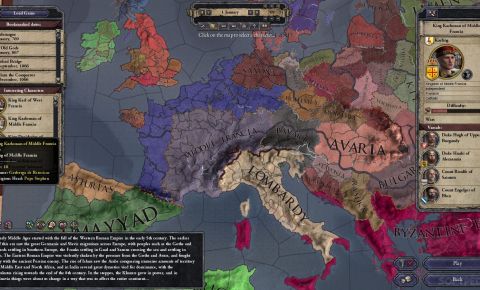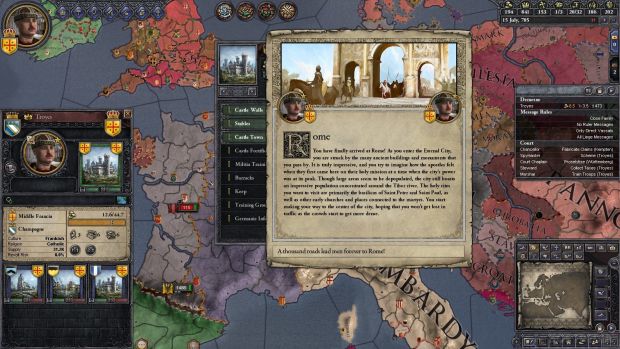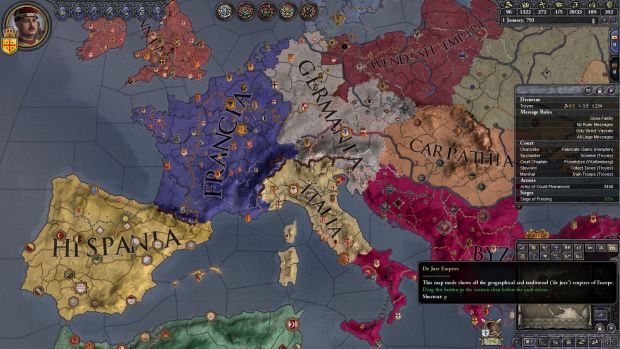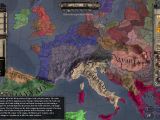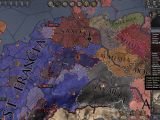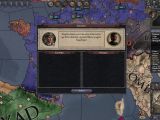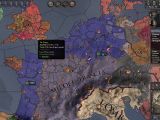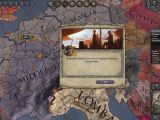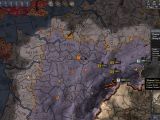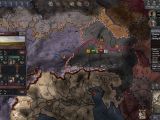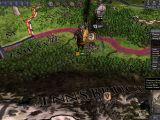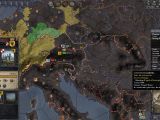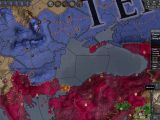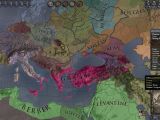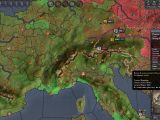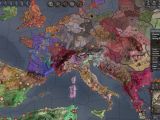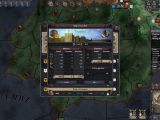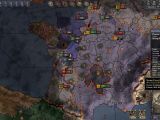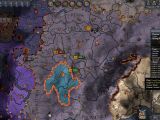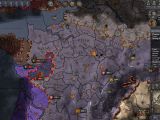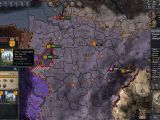The Crusader Kings name has always been somewhat of a relic for the grand strategy title from Paradox, as the mechanics of the series shifted further away from the wars over control of the religious sites that are sacred to both Christianity and Islam and more towards the inner working of the ruling families of Europe and the territories adjacent to it.
The new Charlemagne expansion is another departure, as it moves the start date back to 769 and allows players to experience the moments when Europe as we now know it was basically born from a political perspective, with the first Attempt to unify most of it under the rising Frankish power.
The expansion feels restrictive in some ways, because so much of the game world is close to being unified under one overall leader, but the fact that there are so many small factions to choose from means that there’s a lot of potential for treachery, territorial gains and general mischief.
Story
In terms of story, gamers are invited to take control of the Charlemagne as he is still just King of West Francia, yet unworthy of his title, and choose how they want to deal with a variety of problems, from his brother Karloman to the presence of an Islamic power in Spain.
The historical setup creates a lot of choices and the development team has also introduced a wide array of events, plenty of them dynamically generated, to keep players engaged and create a course that’s roughly similar to what happened in the real world.
The problem is that the decisions heavily favor historical choices, which can be a little annoying, but the upside is that following in the footsteps of Charlemagne is a great way of seeing how impressive his achievements were.
I found it hard to replicate his deeds in my own playthroughs, but I plan to persevere.
Those who do not like the Frankish rulers can choose from a wide array of others, with different levels of challenge, and then set their own objective, like bringing the Byzantines to rule over Europe once more or making the Slavs develop their own Empire before 850 rolls around.
Gameplay
The biggest gameplay change in Charlemagne for Crusader Kings II is linked to the vassals, which are now limited by the characteristics of the ruler and the laws of the land, with heavy penalties associated to any transgression.
For the big Frankish Empire, this means carefully moving counts and dukes around to create a more streamlined feudal hierarchy, which can at times feel like busywork.
When the new scenario starts, Europe is not all feudal, and that means there are plenty of nations ruled under a tribal system.
The new political organization form is focused on prestige rather than money and allows players to quickly recruit troops that can be then used for both traditional conquest and for raiding.
Tribal nations can be very powerful early in Crusader Kings II – Charlemagne, but players who choose to control one need to carefully keep track of their income and at one point need to try and become either a classic feudal kingdom or a merchants republic, which requires research and some work to get a castle or a coastal province.
Until they do that, they can pose a lot of problems for their neighbors, and I often found that my attempts to rule over a Europe unified under the Frankish empire were thwarted by them.
Charlemagne is focused on the West of Europe, but playing steppe nations or Islamic rulers can also be very fun.
Assassinations are also significantly changed with Charlemagne, with the action no longer available via the diplomacy skill.
Basically, gamers need to create a plot against someone and see it through rather than try to take them out quickly as long as they have the money.
Most players tended to rely on assassination quite a bit once they progressed in Crusader Kings II, and there are moments when I also miss the choice, but the game does feel a little more plausible this way from a historical point of view.
Another issue which Paradox seems unable to solve at the moment is the adventures, which allow some characters with claims on a title to gather huge armies and depose already established lords who cannot hope to get as many men under arms to counter the attack.
These are issues that can change the course of a campaign on Crusader Kings II, but overall the gameplay is complex but intelligible and delivers a very wide array of choices and possibilities.
Graphics and audio
The look of Crusader Kings II has not changed fundamentally since the game was launched and continues to offer gamers all the info they need, as long as they are willing to dig behind a few panels of details, while also alerting them about the state of the faction and the actions they can undertake.
The views for the map are informative and there are plenty of ways to control exactly what gets shown.
Charlemagne does come with some new cosmetic DLC, but it is not essential in any way.
The soundtrack of the title also offers no surprises and manages to conform to the period, although it can get a little repetitive, given how many hours players tend to invest in Crusader Kings II.
Multiplayer
Charlemagne expands the multiplayer experience as it does the single player, but as always, the game requires a group of friends who can commit to the long-term requirements of completing a campaign of Crusader Kings II.
The Good
- Tribal mechanics
- Vassal limits
The Bad
- Assasination mechanics are limited
- Adventurers and tribes can sometimes be unbalanced militarily
Conclusion
A beta patch which is very stable on my computer is already available for all those interested and a complete update is expected to arrive soon.
The expansion might be the last one to be offered for Crusader Kings II and many might see it as underwhelming, but it does incorporate some cool mechanics that expand the scope of the grand strategy experience in interesting ways.
Players can now take control of a wide variety of families and factions in the Dark Ages in 769 and control them for hundreds of years, experiencing success and failure and some pretty impressive chains of events.
Crusader Kings II is the most complex title that Paradox Interactive, a company known for the depth of its releases, has ever created and the already impressive mods released for it, the best of which is the one based on A Song of Ice and Fire, will certainly find new ways to expand it in the future.
For long-term fans, Charlemagne is a must-buy because it makes the game feel complete, almost two years after it was first launched on the PC, although a few small issues still need to be solved.
For newcomers to the series, the best idea is to pick up the base title, the Sword of Islam and The Old Gods expansion and play them before deciding whether the rest of the offered content is appealing.
 14 DAY TRIAL //
14 DAY TRIAL // 